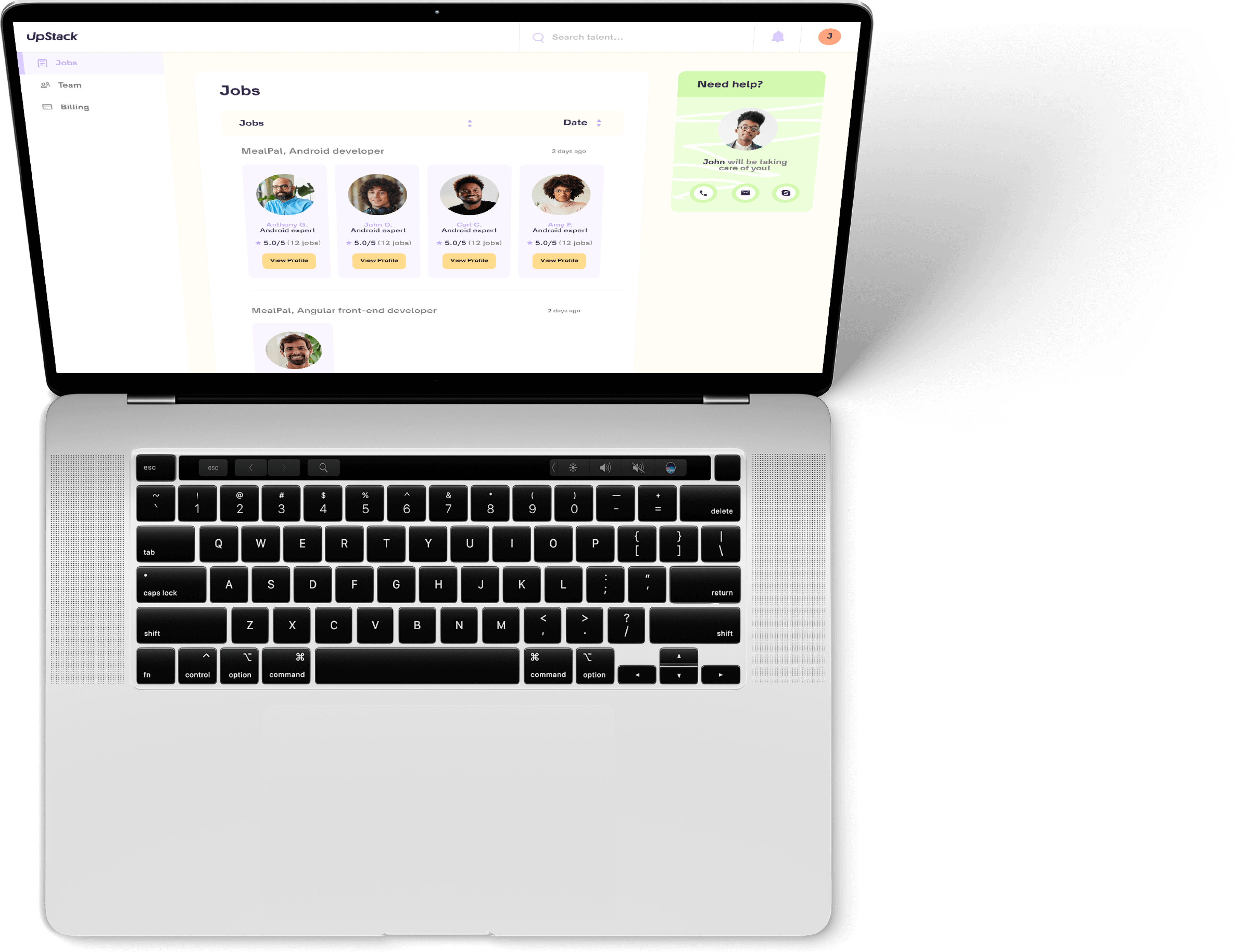


Hire Objective-C Developers {Devs Ready!}
Stella B.
Available
Objective-C Developer
-
Experienced Objective-C engineer with seamless project implementation
-
Loves guacamole & hates spoilers

-
Marcus T.
Available
Objective C Engineer
-
Stacked portfolio of beautiful, functional websites
-
Known for his epic charcuterie & cheese boards

-
David M.
Available
Mobile Developer
-
Mobile engineering guru with a knack for translating stakeholder needs
-
Would rather be diving Palau’s Blue Corner

-
Top Objective-C Developers with Upstack
Hire Objective-C Developers with Upstack
Hiring an Objective-C developer can be a major decision for any company, as it can have a significant impact on the success of a project. But with so many developers to choose from, it can be difficult to know exactly what to look for. Instead of relying solely on a job description or resume, there are a few essential criteria you should consider when hiring an Objective-C programmer. These include experience in the language, knowledge of the software development life cycle, and the ability to work with others. Taking the time to evaluate potential developers on these criteria can help ensure that you hire the right person for the job.
What is Objective-C?
The Objective-C programming language was created in the early 1980s, and has been a common language in the development of iOS apps since they were first released in 2008. As such, the majority of developers with experience in the language will have worked on an iOS app. This is important to keep in mind if you’re building an app for a different platform like Android or Windows. If you do require an Objective-C developer, you will likely have to hire someone with experience on iOS apps.
What qualities and skills should you look for in an Objective-C developer?
There are a number of qualities that you’ll want to look for in any developer, regardless of the programming language they use. These include attention to detail, strong communication skills, and the ability to work efficiently under pressure. But there are a few specific skills that are particularly important for an Objective-C programmer. These include a solid understanding of the software development life cycle, programming ability, and a strong familiarity with the iOS operating system. You should also make sure that they have experience working in a team environment, as most projects will require collaboration with other developers. Finally, it’s important to look for a developer who is willing to learn and grow. As technology evolves and new programming languages emerge, it’s essential that developers continue to update their skills and remain current with industry standards.
Understanding of software development life cycle
An understanding of the software development life cycle (SDLC) is important for any type of developer, as it outlines the process for building a software product. However, there are variations of the SDLC for each specific programming language, and it’s important to ensure that your developer understands the version associated with your language. An understanding of the SDLC can have a significant impact on the success of a project, as it determines how each step of the process will be carried out. If your programmer doesn’t fully understand the process, the project is likely to be behind schedule and over budget. Additionally, the quality of the finished product will likely be impacted. It’s important to make sure that your developer fully grasps all aspects of the SDLC, including the importance of testing and validation.
Ability to work with teams
Communication is essential in any industry, but it’s particularly important in the tech world. When your developer is working on a team, they will need to be able to communicate with the team members. This means they should be able to communicate clearly and effectively, both verbally and in writing. There are a number of ways to test a developer’s ability to communicate, including giving them a technical or design challenge that requires written communication. You can also ask them to complete a team-building exercise, such as a mock conference call. Communicating clearly is important for more than just written and verbal communication. It’s also important that your developer is able to communicate well with the client. This means being able to effectively present their ideas and respond to feedback from the client.
Soft skills
Soft skills may not be a specific skill listed on a developer’s resume, but they are an important part of the hiring process. These include problem-solving skills, flexibility, and the ability to stay calm under pressure. Problem-solving skills are important for any type of developer, but they are particularly important for an Objective-C developer, as they will likely be required to solve some technical issues. Even the most experienced and skilled developers will occasionally face technical problems, and your developer will need to know how to solve them. Additionally, it’s important to hire a programmer who is able to stay calm under pressure, as it’s likely that there will be some high-pressure moments during the development process.
Technical knowledge
Technical knowledge is essential for any programmer, but it’s particularly important for an Objective-C developer. You should hire someone who has a good grasp of current technology trends, and is aware of any upcoming changes in the industry. If a developer doesn’t stay up to date on new developments, they may use outdated technology on a project and risk missing a deadline. While it’s impossible for any developer to know everything about every programming language, it’s important to hire someone who is eager to learn new skills and gain new technical knowledge.
Adaptability
Although it’s important to hire someone with a solid technical understanding, it’s even more important to hire someone who is adaptable. A programmer needs to be able to roll with the punches and be open to change. As a project progresses, it’s likely that changes will be required in the design or functionality of the app. Your developer needs to be able to respond to those changes, and be willing to learn new things as the project progresses.
Interview tips for hiring an Objective-C programmer
Hiring an Objective-C developer can be a major decision for any company, as it can have a significant impact on the success of a project. The hiring process can be overwhelming, but there are a few steps you can take to make it easier. First, make sure you have a thorough job description. The job description should include the skills and experience required for the position. Next, create a list of questions you want to ask the candidates. It’s important to ask open-ended questions that allow the candidate to provide details on what they’ve done in the past. And finally, make sure to remember that personality plays a large role in the hiring process.
They trust Our Objective-C Developers
Why hire a Objective-C developer with Upstack
![Objective-C Developer and Programmer]()
Top Objective-C talent pre-vetted for a perfect fit.
Our 8-point assessment evaluation ensures that every senior Objective-C developer you interview exceeds expectations across technical, cultural, and language criteria.
![Objective-C Programmers Computer Icon]()
Hire reliable, passionate Objective-C developers.
From late-night sprints to jumping on a last-minute face-to-face, we ensure that your recruits are down to get the job done right.
![Objective-C Programmers High Five Icon]()
Risk-free 14-day trial.
Confidently onboard candidates with our no-questions-asked trial period. We’ll walk you through the contract-to-hire process if and when you’re ready to make it permanent with your new Objective-C engineer.
![Objective-C Computer Programmer Icon]()
Our Client Success Experts provide white-glove service.
Stay laser-focused on your business goals while our team of experts curates potential candidates and manages seamless programmer onboarding.
![Objective-C Developer Writing Notes Icon]()
Build your optimal team confidently, quickly.
UpStack handles everything including background and reference checks, legal issues, and more. Our platform streamlines billing, timesheets, and payment all in one easy-to-access place.
Schedule a call with a Client Success Expert to get starting hiring a Objective-C developer.
Start hiring Start hiring Start hiring
Hire from the Best.
Working with our Client Success Experts, we’ll help you build the remote team of your dreams with top Objective-C talent from around the world.
Pre-vetted, reliable Objective-C developers are standing by.





Hiring Objective-C Developers | FAQs
How much does it cost to hire a Objective-C developer?
UpStack has a simple billing model where each Objective-C developer has a standard hourly rate averaging between $65-$75 per hour. Rates are based on skills, knowledge, and experience, and our developers are available mainly for full-time engagement (40 hours per week) and the occasional part-time opportunity (20 hours per week).
What is the process to find a Objective-C developer?
You’ll connect with an UpStack Client Success Manager to determine your immediate needs. Our team uses a combination of AI and personal assessment to short-list candidates that match your job requirements. From there, you interview, select, and onboard the perfect developer, all within days of your initial call.
How does UpStack find its Objective-C developers?
UpStack’s talent recruitment team connects with software developers around the globe every day. Each Objective-C programmer is vetted for technical, communication, and other soft skills necessary for a developer to successfully work with your team. Once vetted, the candidates are accepted into the UpStack developer community.
How is UpStack different from an agency or recruiter?
UpStack's community of available, pre-vetted engineering talent means minimizing roadblocks to scaling your team effectively, efficiently, and immediately. Our Client Success Experts work with you and your UpStack developer to ensure a smooth and seamless engagement.
Can I hire UpStack Objective-C developers directly?
Yes, you can hire UpStack Objective-C developers at any time, and with the same assurance of smoothly on boarding talent risk-free. First, we’d create a job opening on our portal. Then, we’d vet, interview, and match developers that meet your needs. If you’re satisfied at the end of the 14-day trial period, at any time you can directly hire them.
Common Objective-C FAQs
What is Objective-C?
Objective-C is a general-purpose, object-oriented programming language that was developed in the early 1980s. It is widely used for developing applications for Apple's macOS and iOS operating systems, as well as for the NeXTSTEP operating system. Objective-C is known for its dynamic binding, which allows for flexibility and ease of use, as well as its ability to be used with other programming languages. It is often used in conjunction with the Cocoa and Cocoa Touch frameworks, which provide a set of libraries and tools for building applications for the macOS and iOS platforms. Objective-C is similar to the C programming language, but it adds features such as classes, objects, and methods, as well as support for dynamic binding. It is a compiled language, which means that the source code is converted into machine code that can be executed by a computer. Objective-C is a popular choice for developing applications for Apple's platforms, and it has a large and active community of users and developers. If you are interested in learning Objective-C, there are many resources available, including online tutorials, books, and courses.
How do I build an objective-c module?
To build an Objective-C module, you will need to follow these steps:
- Create a new project in Xcode: Open Xcode, go to File > New > Project, and choose the "Cocoa Touch Framework" template. Give your project a name and select a location to save it.
- Add source files to the project: Create a new Objective-C file for your module by going to File > New > File, selecting "Objective-C File" from the list of file templates, and giving it a name. You can also add other source files and resources to the project as needed.
- Configure the build settings: Go to the project settings by clicking on the project name in the navigator, and then click on the "Build Settings" tab. Make sure that the "Objective-C Automatic Reference Counting" (ARC) option is enabled. You can also customize other build settings as needed.
- Build the module: To build the module, go to the Product menu and select "Build." This will compile the source files and create a framework file that can be used in other projects.
- Use the module in another project: To use the module in another project, you will need to add it to the project's library search paths and link it to the project. To do this, go to the project settings, click on the "Build Settings" tab, and add the path to the module's framework file to the "Library Search Paths" setting. Then, go to the "Link Binary With Libraries" section and add the module's framework file to the list of linked libraries.
Keep in mind that these are just general steps for building an Objective-C module. The specific details may vary depending on your project.
Is Objective-C dead?
No, Objective-C is not dead. While it is true that Objective-C has lost some popularity in recent years, it is still a widely used programming language and is not considered to be "dead." Objective-C is a general-purpose, object-oriented programming language that was developed in the 1980s and is widely used for developing applications for Apple's macOS and iOS operating systems. It is known for its dynamic binding and ability to be used with other programming languages, and it is often used in conjunction with the Cocoa and Cocoa Touch frameworks. While Objective-C has been superseded by newer languages, such as Swift, in some areas, it is still a widely used language and has a large and active community of users and developers. Many existing applications are written in Objective-C, and it is likely to continue to be used for the foreseeable future.
How do I import a Swift file in Objective C?
To import a Swift file into an Objective-C project, you will need to follow these steps:
- Make sure that the Swift file is part of the same project as the Objective-C file: The Swift file needs to be added to the same Xcode project as the Objective-C file in order to be imported. To do this, select the project in the navigator, go to File > Add Files to "Project Name," and select the Swift file.
- Import the Swift file into the Objective-C file: To import the Swift file into the Objective-C file, you will need to use the #import directive, followed by the name of the Swift file. For example:
Copy code#import "MySwiftFile.swift"
- Use the Swift class or function in the Objective-C file: Once the Swift file has been imported, you can use the class or function defined in the Swift file in your Objective-C code. For example:
Copy codeMySwiftClass *swiftClass = [[MySwiftClass alloc] init]; [swiftClass doSomething];
Keep in mind that you may need to add the @import directive to the Objective-C file's header if you are using Swift classes or functions in an Objective-C header file. It's also worth noting that you can use Swift classes and functions in an Objective-C file without importing the Swift file directly. Instead, you can create a bridging header file that imports the Swift file and add the bridging header to your Objective-C target. This can be useful if you want to use multiple Swift files in your Objective-C code.
Can objective-c run on windows?
Objective-C is primarily used for developing applications for Apple's macOS and iOS operating systems, and it is not natively supported on Microsoft Windows. However, it is possible to run Objective-C code on Windows using third-party tools, such as:
- Cygwin: Cygwin is a Unix-like environment for Windows that includes a compiler and tools for developing and running Objective-C code.
- GCC: GCC (GNU Compiler Collection) is a compiler that can be used to compile and run Objective-C code on Windows. It is available as part of the MinGW (Minimalist GNU for Windows) project.
- Visual Studio: Microsoft Visual Studio includes support for Objective-C development through an extension called "Objective-C for Visual Studio." This extension allows you to create, edit, and debug Objective-C code in Visual Studio.
Keep in mind that running Objective-C on Windows may be more difficult and require more setup than on macOS or iOS. It is also important to note that Objective-C is primarily used for developing applications for Apple's platforms, and running Objective-C code on Windows may not provide the same level of functionality as on macOS or iOS.















